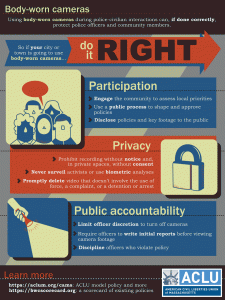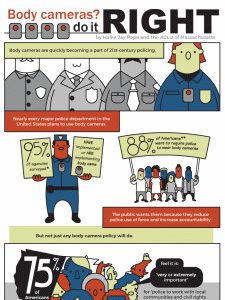Police body-worn cameras: Let's do it right
Body-worn cameras can be a useful tool in preserving evidence of police misconduct, providing greater oversight, and increasing accountability of police officers. But like any policing technology, body-worn cameras have the high potential for abuse. Without proper protocols and limitations, body-worn cameras can be another surveillance tool with a disproportionate impact on over policed minority communities.
Accordingly, the ACLU of Massachusetts believes that if a city or town adopts a body-worm camera program, they need to do it right. To that end, the ACLU of Massachusetts offers a model policy that follows four core principles: improving public safety, ensuring police accountability, enhancing community-police relations, and protecting privacy. This model policy also includes a “No Tape, No Testimony” proposal favoring evidentiary consequences for officers who are found to have unreasonably or in bad faith failed to record crucial incidents.
Check out these comics to learn more about the effectiveness of body cameras and the qualities of a good policy:



